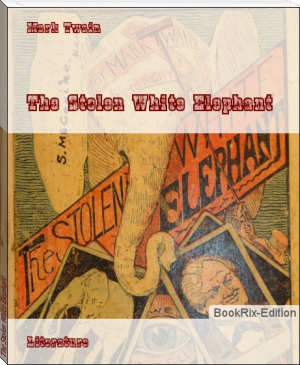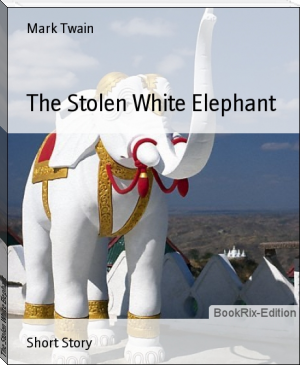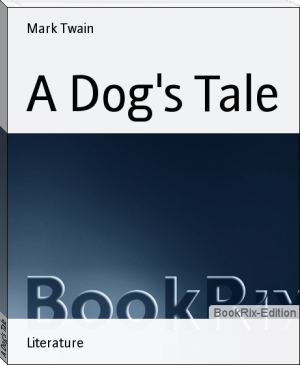author - "Mark Twain"

ch of delicate pink dust in the hole. Iput my finger in, to feel it, and said OUCH! and took it out again. Itwas a cruel pain. I put my finger in my mouth; and by standing first onone foot and then the other, and grunting, I presently eased my misery;then I was full of interest, and began to examine.
I was curious to know what the pink dust was. Suddenly the name of itoccurred to me, though I had never heard of it before. It was FIRE! Iwas as certain of it as a person could be of anything in the world. Sowithout hesitation I named it that--fire.
I had created something that didn't exist before; I had added a newthing to the world's uncountable properties; I realized this, and wasproud of my achievement, and was going to run and find him and tell himabout it, thinking to raise myself in his esteem--but I reflected, anddid not do it. No--he would not care for it. He would ask what it wasgood for, and what could I answer? for if it was not GOOD for something,but only beautiful, merely bea

evil give to him with his own hands, and told him he could cure anybody with it and fetch witches whenever he wanted to just by saying something to it; but he never told what it was he said to it. Niggers would come from all around there and give Jim anything they had, just for a sight of that five-center piece; but they wouldn't touch it, because the devil had had his hands on it. Jim was most ruined for a servant, because he got stuck up on account of having seen the devil and been rode by witches.
Well, when Tom and me got to the edge of the hilltop we looked away down into the village and could see three or four lights twinkling, where there was sick folks, maybe; and the stars over us was sparkling ever so fine; and down by the village was the river, a whole mile broad, and awful still and grand. We went down the hill and found Joe Harper and Ben Rogers, and two or three more of the boys, hid in the old tanyard. So we unhitched a skiff and pulled down the river two mile and a half, to the big scar

as stumped, and set still. I was most ready to cry; but all at once I thought of a way, and so I offered them Miss Watson--they could kill her. Everybody said:
"Oh, she'll do. That's all right. Huck can come in."
Then they all stuck a pin in their fingers to get blood to sign with, and I made my mark on the paper.
"Now," says Ben Rogers, "what's the line of business of this Gang?"
"Nothing only robbery and murder," Tom said.
"But who are we going to rob?--houses, or cattle, or--"
"Stuff! stealing cattle and such things ain't robbery; it's burglary," says Tom Sawyer. "We ain't burglars. That ain't no sort of style. We are highwaymen. We stop stages and carriages on the road, with masks on, and kill the people and take their watches and money."
"Must we always kill the people?"
"Oh, certainly. It's best. Some authorities think different, but mostly it's considered best to kill them--except some that you bring to the cave here, and keep them till they're ra

"I didn't mean so bad as that, Aleck; I didn't really mean immoral piety, I only meant--meant--well, conventional piety, you know; er--shop piety; the--the--why, YOU know what I mean. Aleck--the--well, where you put up that plated article and play it for solid, you know, without intending anything improper, but just out of trade habit, ancient policy, petrified custom, loyalty to--to--hang it, I can't find the right words, but YOU know what I mean, Aleck, and that there isn't any harm in it. I'll try again. You see, it's this way. If a person--"
"You have said quite enough," said Aleck, coldly; "let the subject be dropped."
"I'M willing," fervently responded Sally, wiping the sweat from his forehead and looking the thankfulness he had no words for. Then, musingly, he apologized to himself. "I certainly held threes-- I KNOW it--but I drew and didn't fill. That's where I'm so often weak in the game. If I had stood pat--but I didn't. I never do. I don't know enough."
Confessedly defea

Description
The Prince and the Pauper remains one of Twain’s more popular novels, having been adapted many times for the stage, screen, and elsewhere. When Tom Canty, a young pauper in London, meets Prince Edward, the two switch clothes and assume the other’s identity. Tom then learns the life of royalty, while the true prince discovers the troubles of commoners.
As usual, Twain delivers both humor and social commentary in abundance. Although aimed at children, Pauper provides moral and social criticism of topics like the justice system and inequality, and deals with themes which appeal to readers of all ages.

Description
When Orion Clemens is appointed Secretary of the Nevada Territory, his brother Samuel Clemens, better known by his pen name Mark Twain, joins him on his journey west. Together with their all-important six pounds of Unabridged Dictionary they make their way to Nevada in a six-horsed mail coach and are, of course, derailed by all sorts of problems.
In Roughing It Twain combines the beautiful descriptions of the West’s idyllic landscape with his now-patented sense of humor. He joins the silver and gold mining scramble, begins his career as a writer working for different newspapers and journals, visits the Mormons of Salt Lake City, and even makes his way to Hawaii, then still known as the Sandwich Islands.
Roughing It was written as a prequel to his earlier travelogue The Innocents Abroad.

The Adventures of Huckleberry Finn was first printed in 1884, eight years after Mark Twain wrote The Adventures of Tom Sawyer. It starts up where the other story finished, and the two books together are believed to be the best that Mark Twain ever wrote.
Huck travels down the Mississippi on a raft, facing many dangers on the way, and learning about life and what it means to be a friend.
There are truths that Twain tries to get people to think about through this book. One is to make us laugh at some of the crazy things that we believe without any good reason to believe them; and the other is is to make us question the way that people thought about slaves at the time of the story, in America in the 1850s.

ch of delicate pink dust in the hole. Iput my finger in, to feel it, and said OUCH! and took it out again. Itwas a cruel pain. I put my finger in my mouth; and by standing first onone foot and then the other, and grunting, I presently eased my misery;then I was full of interest, and began to examine.
I was curious to know what the pink dust was. Suddenly the name of itoccurred to me, though I had never heard of it before. It was FIRE! Iwas as certain of it as a person could be of anything in the world. Sowithout hesitation I named it that--fire.
I had created something that didn't exist before; I had added a newthing to the world's uncountable properties; I realized this, and wasproud of my achievement, and was going to run and find him and tell himabout it, thinking to raise myself in his esteem--but I reflected, anddid not do it. No--he would not care for it. He would ask what it wasgood for, and what could I answer? for if it was not GOOD for something,but only beautiful, merely bea

evil give to him with his own hands, and told him he could cure anybody with it and fetch witches whenever he wanted to just by saying something to it; but he never told what it was he said to it. Niggers would come from all around there and give Jim anything they had, just for a sight of that five-center piece; but they wouldn't touch it, because the devil had had his hands on it. Jim was most ruined for a servant, because he got stuck up on account of having seen the devil and been rode by witches.
Well, when Tom and me got to the edge of the hilltop we looked away down into the village and could see three or four lights twinkling, where there was sick folks, maybe; and the stars over us was sparkling ever so fine; and down by the village was the river, a whole mile broad, and awful still and grand. We went down the hill and found Joe Harper and Ben Rogers, and two or three more of the boys, hid in the old tanyard. So we unhitched a skiff and pulled down the river two mile and a half, to the big scar

as stumped, and set still. I was most ready to cry; but all at once I thought of a way, and so I offered them Miss Watson--they could kill her. Everybody said:
"Oh, she'll do. That's all right. Huck can come in."
Then they all stuck a pin in their fingers to get blood to sign with, and I made my mark on the paper.
"Now," says Ben Rogers, "what's the line of business of this Gang?"
"Nothing only robbery and murder," Tom said.
"But who are we going to rob?--houses, or cattle, or--"
"Stuff! stealing cattle and such things ain't robbery; it's burglary," says Tom Sawyer. "We ain't burglars. That ain't no sort of style. We are highwaymen. We stop stages and carriages on the road, with masks on, and kill the people and take their watches and money."
"Must we always kill the people?"
"Oh, certainly. It's best. Some authorities think different, but mostly it's considered best to kill them--except some that you bring to the cave here, and keep them till they're ra

"I didn't mean so bad as that, Aleck; I didn't really mean immoral piety, I only meant--meant--well, conventional piety, you know; er--shop piety; the--the--why, YOU know what I mean. Aleck--the--well, where you put up that plated article and play it for solid, you know, without intending anything improper, but just out of trade habit, ancient policy, petrified custom, loyalty to--to--hang it, I can't find the right words, but YOU know what I mean, Aleck, and that there isn't any harm in it. I'll try again. You see, it's this way. If a person--"
"You have said quite enough," said Aleck, coldly; "let the subject be dropped."
"I'M willing," fervently responded Sally, wiping the sweat from his forehead and looking the thankfulness he had no words for. Then, musingly, he apologized to himself. "I certainly held threes-- I KNOW it--but I drew and didn't fill. That's where I'm so often weak in the game. If I had stood pat--but I didn't. I never do. I don't know enough."
Confessedly defea

Description
The Prince and the Pauper remains one of Twain’s more popular novels, having been adapted many times for the stage, screen, and elsewhere. When Tom Canty, a young pauper in London, meets Prince Edward, the two switch clothes and assume the other’s identity. Tom then learns the life of royalty, while the true prince discovers the troubles of commoners.
As usual, Twain delivers both humor and social commentary in abundance. Although aimed at children, Pauper provides moral and social criticism of topics like the justice system and inequality, and deals with themes which appeal to readers of all ages.

Description
When Orion Clemens is appointed Secretary of the Nevada Territory, his brother Samuel Clemens, better known by his pen name Mark Twain, joins him on his journey west. Together with their all-important six pounds of Unabridged Dictionary they make their way to Nevada in a six-horsed mail coach and are, of course, derailed by all sorts of problems.
In Roughing It Twain combines the beautiful descriptions of the West’s idyllic landscape with his now-patented sense of humor. He joins the silver and gold mining scramble, begins his career as a writer working for different newspapers and journals, visits the Mormons of Salt Lake City, and even makes his way to Hawaii, then still known as the Sandwich Islands.
Roughing It was written as a prequel to his earlier travelogue The Innocents Abroad.

The Adventures of Huckleberry Finn was first printed in 1884, eight years after Mark Twain wrote The Adventures of Tom Sawyer. It starts up where the other story finished, and the two books together are believed to be the best that Mark Twain ever wrote.
Huck travels down the Mississippi on a raft, facing many dangers on the way, and learning about life and what it means to be a friend.
There are truths that Twain tries to get people to think about through this book. One is to make us laugh at some of the crazy things that we believe without any good reason to believe them; and the other is is to make us question the way that people thought about slaves at the time of the story, in America in the 1850s.


